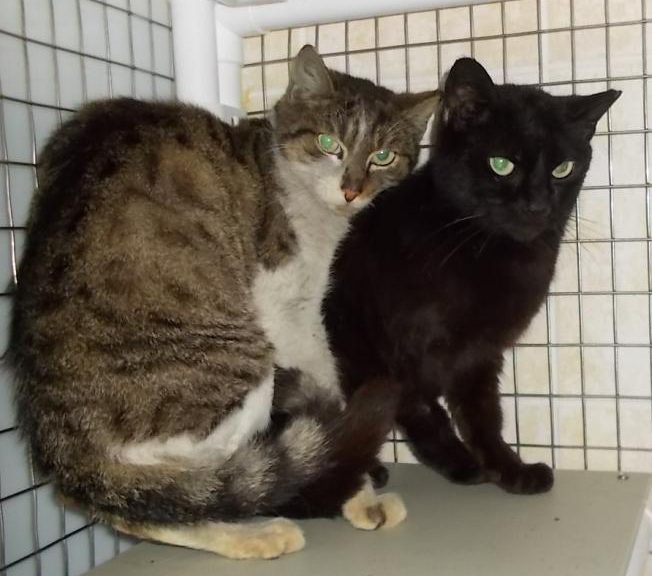We at Chats du Quercy are against cat cafés, the sale, exhibition and adoption of cats in shops. Already many countries ban the sale or adoption of cats and dogs in pet shops.
Cats are territorial animals. A cat establishes an area where it sleeps and eats – its home base – and where it hunts and interacts with other cats and animals – its home range.
The territory radiates from the home base. Cats are extremely sensory animals, their sense of hearing and smell is more elevated than that of a human.
Abandoned cats and stress
Abandoned cats experience a huge amount of stress simply because they are abandoned and have lost everything they know, their family, their territory, their home base and all the smells and noises they are used to.
A cat will arrive in a foster family or adoption centre, will hopefully be given assessment and vet treatment which means manipulation from strangers, people it is doesn’t know, in a strange environment with even stranger sounds and smells.
Cats normally work hard to avoid chance encounters with other cats which could lead to fighting and injury, in a foster home or refuge, they may be mixed with other cats that they don’t know and who may show fear and aggression towards it.
The cat is most likely unsure of what is happening and disturbed, which equates to colossal stress for the cat.
Cat Cafés
Chats du Quercy opposes cat cafés because of the risks of stress, disease transmission and poor welfare for cats.
We are hugely concerned about the welfare implications of having several cats in a limited space with groups of people unknown to them coming and going throughout the day increasing the risk of infection and illness. We also believe this kind of environment is not suitable for domestic cats because they have evolved as solitary animals and generally do not choose to live in social groups – unlike dogs which are a social species.
Sharing an enclosed space and resources with several unrelated cats can lead to a range of negative feelings and emotions resulting in aggression and behavioural issues, and it isn’t always easy to identify whether a cat’s welfare is compromised as the signs can often be very subtle, easily missed or misinterpreted.
We don’t believe these environments can consistently provide cats with a good quality of life and are hugely concerned that many cats will be unhappy as a result.
It is very likely that some or all the cats involved will become stressed because of being in a confined space with a continually changing group of people. This is because domestic cats have shared ancestry with the African wildcat, so we still see a lot of these behaviours in our pet cats today. This is not an ‘outdated’ view – in fact, recent research* into cat behaviour counters the opinion that cats living in groups do not suffer social stress.
Furthermore, if the intention is to home cats from the café, this would create a ‘rolling’ population of rescue cats – in a café, this would create even more stress and further compromise feline welfare because rescue cats need as stable an environment as possible to reduce the possibility of stress-related and infectious diseases such as cat flu, and other issues such as over-grooming and urine spraying.
We believe that people who care about the wellbeing of cats would not want them to be exploited as a gimmick to sell coffee and would therefore not wish to encourage the launch of these establishments.
*Research looking at the prevalence of behaviour problems in the general cat population showed that aggressive behaviour between cats and fear of other cats accounted for a high percentage of cats surveyed. Ref: Bradshaw, J.W.S Casey, R.A & MacDonald J.M (2000) The occurrence of unwanted behaviour in the pet cat population, Proceedings of the Companion Animal Behaviour Therapy Study Group Day, Birmingham, UK, pp 41-42
Adopting cats from shops
If the decision is made to take some cats from the adoption centre to a shop then you are placing them in a small cage in an alien environment.
There are likely to be many more people prodding and poking the cat, children shouting, intercoms in operation, more strange smells and noises that attack their sensitive ears, adding enormously to their stress and is totally against their well-being.
Cats hide illness
Cats are experts at hiding illnesses. As a potential adoptant, you will not be able to judge whether the cat is healthy, or just stressed in a shop situation.
You will be unable to handle it properly, nor see it in a more natural environment where its five basic needs are being catered for.
For the human adoptant the decision is often an impulsive one, one that has not been thought through, one that on reflection they may not have the time for, nor the finances.
It maybe that their children have pestered to have the cute cat in the cage, most often the charity helpers are not best placed to give the correct advice concerning the cats in their care, or they are simply too eager to make another adoption, whatever the cost to the cat and its future well-being.
Reflect and consider
PLEASE reflect before adopting a cat under these circumstances, PLEASE approach a reputable cat charity, visiting the cat at the adoption centre and obtaining the advice about the cat’s background, its needs and wants, and question if the cat is the best choice for your family and for its well-being.
If you work in a shop, PLEASE discourage charities or breeders to engage in adoptions days in the shop, PLEASE think more carefully about animal welfare.
If you found this useful…
- Click through to see our cats ready for adoption
- Stay up to date with your free Chats du Quercy newsletter
- Make a donation to help continue our work





